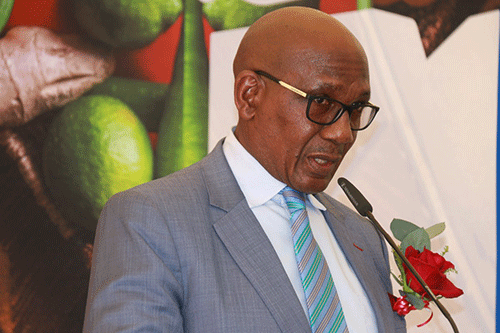Namibia cannot remain at its current level of economic development, consisting of minimal heavy industries and an economy mainly focused on mining only.
Going forward, the country will need to work with Trans National Corporations (TNCs) by reducing exports of its raw materials and encouraging local value addition and beneficiation.
This was the message carried by secretary to Cabinet, George Simataa at the first global South think-tank dialogue in Xiamen, China, last week.
Participating at the event that took place under the theme, ‘Global South: Working together to advance modernisation’, Simataa emphasised that every country in the world wants to modernise.
He cautioned delegates at the gathering that there are serious implications for not embracing modernisation. “Therefore, modernising the Namibian economy in the mining sector, for example, could be extremely beneficial for richer economies, such as those in Europe and Asia,” said Simataa.
He added that Namibia has the potential to become a huge manufacturing hub because it has large quantities of land, suitable for manufacturing and already has some transport infrastructure in place.
Said Simataa: “For example, Namibia expanded its Port of Walvis Bay, which can now receive approximately 3 000 vessel calls each year and can handle about 5 million tonnes of cargo. The port has world-class infrastructure and equipment to ensure reliable and safe cargo handling”. However, Simataa emphasised that envisaged domestic developments would not be met in the absence of an educated and skilled workforce. “Developing nations need to redouble their investments in education. Better and appropriate education will not only reduce population growth through knowledge of birth control, combating the predicted doubling in the population in the future, but it will also enable people to get better jobs and create a multiplier effect.
“Better jobs lead to higher incomes and improved living standards. More money is then available for the government through taxation, allowing for greater spending on infrastructure, such as transport, housing and healthcare.
“A more skilled workforce would enable the production of more complex and valuable goods. This would, again, lead to the economy expanding, contributing to the multiplier effect,” said Simataa.
The secretary to Cabinet added it is clear nations need to work together to advance and achieve modernisation.
“Therefore, I call upon all nations to embrace the modernisation theory and assist each other in the plight to achieve full economic development,” said Simataa. Meanwhile, the management of Namibia’s Green Hydrogen Programme (NGHP) this week noted that the establishment of a green hydrogen sector in Namibia will significantly diversify the economy through the establishment of a thriving synthetic fuels industry as well as industries related to the renewable energy sphere. Besides economic diversification, these new industries are anticipated to greatly contribute to employment creation. Moreover, World Bank regional vice president for eastern and southern Africa Victoria Kwakwa this week echoed the diversification sentiment.
During a courtesy call to President Hage Geingob, Kwakwa lauded Namibia’s green hydrogen ambitions but cautioned the country should not neglect equally important sectors that can reduce inequality and create much-needed jobs.
“The green industrialisation, yes, it’s the one that’s going to do the heavy lifting. But you’re also going to have to continue work on supporting small and medium enterprises because it is really important for equity and addressing some of the significant inequalities. You’re going to have to create an ecosystem that allows them to have the skills and access to finance that allows them also to thrive,” said Kwakwa.
– ebrandt@nepc.com.na


